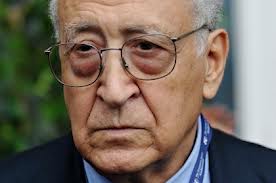 U.N.-Arab League envoy Lakhdar Brahimi, who arrived in Damascus Monday, believes President Bashar al-Assad could contribute to the transition to a “new” Syria, but not as the country’s leader, Agence France-Presse reported.
U.N.-Arab League envoy Lakhdar Brahimi, who arrived in Damascus Monday, believes President Bashar al-Assad could contribute to the transition to a “new” Syria, but not as the country’s leader, Agence France-Presse reported.
Brahimi, who was in Syria on the latest leg of a regional tour to rally support for peace talks, spoke about Assad in an interview in Paris with the Jeune Afrique website published Monday.
“Many of those around (Assad) believe his candidacy (for a new presidential term in 2014) is a fact. He considers this an absolute right… He thinks above all of completing his mandate,” AFP quoted the veteran Algerian diplomat as saying.
He added: “What history teaches us is that after a crisis like this there is no going back. President Assad could therefore usefully contribute to the transition from the Syria of before, that of his father (the late president Hafez al-Assad) and himself, to what I call the new Republic of Syria.”
Brahimi said the U.S.-Russian accord to dismantle Syria’s chemical arsenal had transformed Assad from a “pariah” into a “partner” and convinced his supporters even more of his ability to prevail.
Brahimi has a big challenge ahead.
Syria’s fractured opposition doesn’t want to attend the Geneva talks if Assad doesn’t step down, also 19 Islamist rebel groups warned that anyone taking part in the talks would be considered a traitor.
“This conference is the beginning of a process. We hope that the opposition will manage to agree on a credible and representative delegation,” Brahimi said.
“We should not delude ourselves: the entire world will not be present. But as the process continues, it should include as much of the world as possible.”
Brahimi, a veteran international troubleshooter, said he feared that if a settlement could not be reached Syria may become a failed state like Somalia, which has not had a functioning government for two decades.
“The real threat in Syria is not the partition of the country. The real danger is a sort of “Somatization,” but even more deep and lasting than what we have seen in Somalia.”
Rebel army on Iran, Russia
Meanwhile, the Supreme Military Council of the Free Syrian Army on Monday rebuffed the participation of Syria’s allies in the proposed Geneva II conference aimed to end the 31-month Syrian conflict.
“We will not sit down on the negotiation table with those who have blood on their hands. We consider Russia, China, Iran and [Lebanese Shiite group] Hezbollah as the regime’s partners,” FSA said in a statement.
While Hezbollah has sent fighters to battle rebels alongside President Assad’s forces, Russia and China have long vetoed resolutions threatening Damascus.
FSA said its conditions must be fulfilled if Syrian opposition to join the proposed peace talks.
“Geneva II lacks real incentives and a clear road map,” the statement said, adding that there needs to be guarantees from Muslim and Arabic countries before the start of the peace talks.
The rebel army said what has been agreed in Geneva I must be fulfilled before entering any negotiations. Geneva II is meant to decide on how to implement a declaration agreed by the major powers in Geneva in June 2012. The declaration stated that there should be a transitional government in Syria.
FSA said shelling against “Syrian cities and villages must stop; blockades on besieged areas must end.”
“Assad must cede power and his regime members must be tried for all the crimes they committed against Syrians, and transfer of power to form a transitional government must take place,” the statement added.
Al Arabiya

Leave a Reply
You must be logged in to post a comment.